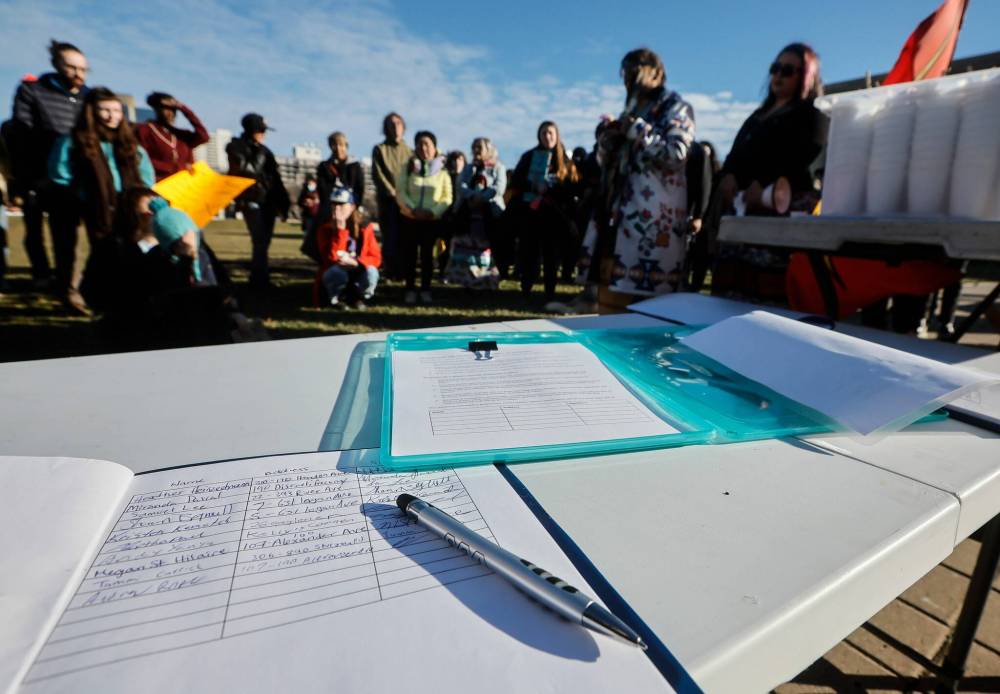Rally urges reforms for new 72-hour detox detention
Advertisement
Read this article for free:
or
Already have an account? Log in here »
We need your support!
Local journalism needs your support!
As we navigate through unprecedented times, our journalists are working harder than ever to bring you the latest local updates to keep you safe and informed.
Now, more than ever, we need your support.
Starting at $15.99 plus taxes every four weeks you can access your Brandon Sun online and full access to all content as it appears on our website.
Subscribe Nowor call circulation directly at (204) 727-0527.
Your pledge helps to ensure we provide the news that matters most to your community!
To continue reading, please subscribe:
Add Brandon Sun access to your Free Press subscription for only an additional
$1 for the first 4 weeks*
*Your next subscription payment will increase by $1.00 and you will be charged $20.00 plus GST for four weeks. After four weeks, your payment will increase to $24.00 plus GST every four weeks.
Read unlimited articles for free today:
or
Already have an account? Log in here »
WINNIPEG — Manitobans who’ve experienced meth-induced psychosis and health-care workers have signed a petition to ensure drug-related detentions are “a last resort.”
More than 200 people gathered on the legislative grounds Sunday to call for reforms to newly unveiled detox facilities built to hold people for up to 72 hours if they are causing a disturbance in public.
“Do people in custody get access to phones? Do they get a shower? Are they going to be allowed to call the people they love — the people who can offer hope, grounding and a reason to fight for recovery?” organizer Monica Ballantyne told the crowd.

Some people gathered at the legislature on Sunday to protest and sign a petition against the Manitoba government’s introduction of 72-hour detention of people using drugs at the legislature in Winnipeg. (John Woods/Winnipeg Free Press)
“Connection is not a luxury. It’s a lifeline.”
Ballantyne collected signatures to lobby the province to ensure there is oversight, including independent reviews of detentions and public reporting on outcomes, related to Bill 48.
The Protective Detention and Care of Intoxicated Persons Act passed on Nov. 5. It received royal assent the next day.
The NDP government has billed the changes as necessary to address the meth crisis and alleviate pressure on emergency rooms.
“Our government is making sure people suffering from addiction who are a danger to themselves and others are stabilized,” Bernadette Smith, minister of housing, addictions and homelessness, said in a Nov. 5 news release.
Smith said these people will not be criminalized but rather provided with “appropriate care and treatment options.”
Chelsea Smith said she was “really taken aback” to learn the minister and Premier Wab Kinew have endorsed this approach. She held up a sign that likened the NDP’s new drug policy to “HUMAN RIGHTS WABBERY.” Other attendees used the slogan, “Care not cages!”
“These facilities don’t work. What works is compassion and community care, harm-reduction initiatives like supervised consumption sites, safe supply, housing,” Smith said, citing her firsthand experience as someone who once used meth on a regular basis.
Leslie Braun, a nurse who attended the event, echoed her concerns that the new facilities are inhumane.
Braun said the new rules promote “locking up” Manitobans without charges or a mental health form.
“People have the right to decline care, treatment — whatever it is that this is supposed to be offering,” she added.
No one can be held for more than 24 hours at a traditional detention location, but “protective care centre” rooms can be used for three days under the legislation.
The new act requires that people be assessed by a health-care professional if they remain intoxicated after a full day at a centre. It allows for involuntary medical exams.
“We cannot expect people to make healthy, life-changing decisions when are detoxing alone, locked in a cell, afraid, confused and cut off from the world,” Ballatyne said.
The community organizer, who has experience being held in a sobering centre, showed up to the legislature in a ribbon skirt.
Attendees participated in smudging and drumming as they listened to numerous people talk about their detox experiences.
One speaker, a Peguis First Nation member who asked to be referred to as Welcoming Red Eagle Woman, urged the Kinew government to “go back to the drawing board.”
“Trauma-informed approaches work,” she said. “Cattle-herding systems (don’t).”
Organizers’ multi-pronged petition requests the province prioritize voluntary, trauma-informed options over detentions.
It also demands the province “uphold Indigenous cultural safety” and provide people who are detained with access to ceremonies and culturally relevant healing resources.
» Winnipeg Free Press
